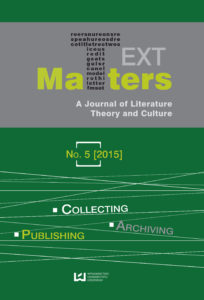Change and the Poetics of Plenitude in Wallace Stevens and John Ashbery
DOI:
https://doi.org/10.1515/texmat-2015-0012Abstract
The essay attends to a paradox found in some crucial poetic efforts by Wallace Stevens and John Ashbery. In some of their most important poetic works Stevens and Ashbery take on the task of positioning the poem toward the plurality of reality, the plurality that is concentrated in the phenomenon of change. As they do so, they invariably encounter a tension within the poem itself: as the poem merges with the flow of changes in the external world-the physical changes in time and space-it also calls up permanent forms of imaginative purposive capability of attending to change, envisioning it, or, indeed, of installing it. These forms must be more permanent than it is postulated by some theories of the poetics of transitiveness, which are polemically discussed in the text. The tension between the element of change and permanence is what allows the poems of Stevens and Ashbery-each poet finding his own aesthetic and epistemic strategy-to put the poem forward not as an external “representation” of change, but as the very source of the abundant possibilities of producing world descriptions in which the notion of change may be meaningful. Such positioning of the poem is what I am calling “the poetics of plenitude.” This poetic strategy makes the poem an aesthetic counterpart to the epistemic action of developing an inquiry, and I am building a definition of this term by reference to the classical pragmatist theory of inquiry. This move is related to my treating Stevens and Ashbery as the poets belonging to the Emersonian-pragmatist intellectual and aesthetic tradition. The paradoxes of change and permanence discussed in the text are treated as inherent in this tradition.
Downloads
References
Abrams, M. H. The Mirror and the Lamp. London: Oxford UP, 1960. Print.
Google Scholar
Altieri, Charles. Painterly Abstraction in Modernist American Poetry. University Park: Pennsylvania State UP, 1989. Print.
Google Scholar
Ashbery, John. Three Poems. New York: Ecco, 1972. Print.
Google Scholar
Bloom, Harold. The Anxiety of Influence: A Theory of Poetry. New York: Oxford UP, 1973. Print.
Google Scholar
DuBois, Andrew. Ashbery’s Forms of Attention. Tuscaloosa: U of Alabama P, 2006. Print.
Google Scholar
Emerson, Ralph Waldo. The Essential Writings of Ralph Waldo Emerson. Ed. Brooks Atkinson. New York: The Modern Library, 2000. Print.
Google Scholar
Epstein, Andrew. Beautiful Enemies: Friendship and Postwar American Poetry. New York: Oxford UP, 2006. Print.
Google Scholar
Herd, David. John Ashbery and American Poetry. Manchester: Manchester UP, 2000. Print.
Google Scholar
James, William. The Writings of William James. Ed. John J. McDermott. New York: Random House, 1967. Print.
Google Scholar
Levin, Jonathan. The Poetics of Transition: Emerson, Pragmatism, and American Literary Modernism. Durham: Duke UP, 1999. Print.
Google Scholar
Mitchell, Charles E. Individualism and Its Discontents: Appropriations of Emerson, 1880-1950. Amherst: U of Massachusetts P, 1997. Print.
Google Scholar
Nehamas, Alexander. Nietzsche: Life as Literature. Cambridge: Harvard UP, 1985. Print.
Google Scholar
Pippin, Robert B. Nietzsche, Psychology, and First Philosophy. Chicago: U of Chicago P, 2010. Print.
Google Scholar
Poirier, Richard. Poetry and Pragmatism. Cambridge: Harvard UP, 1992. Print.
Google Scholar
Richardson, Joan. A Natural History of Pragmatism: The Fact of Feeling from Jonathan Edwards to Gertrude Stein. Cambridge: Cambridge UP, 2007. Print.
Google Scholar
Shusterman, Richard. “Genius and the Paradox of Self-Styling.” Performing Live: Aesthetic Alternatives for the Ends of Arts. Ithaca: Cornell UP, 2000. 201-17. Print.
Google Scholar
Stevens, Wallace. Collected Poetry and Prose. New York: Library of America, 1997. Print.
Google Scholar
Vendler, Helen. On Extended Wings: Wallace Stevens’ Longer Poems. Cambridge: Harvard UP, 1969. Print.
Google Scholar
Downloads
Published
How to Cite
Issue
Section
License

This work is licensed under a Creative Commons Attribution-NonCommercial-NoDerivatives 4.0 International License.













